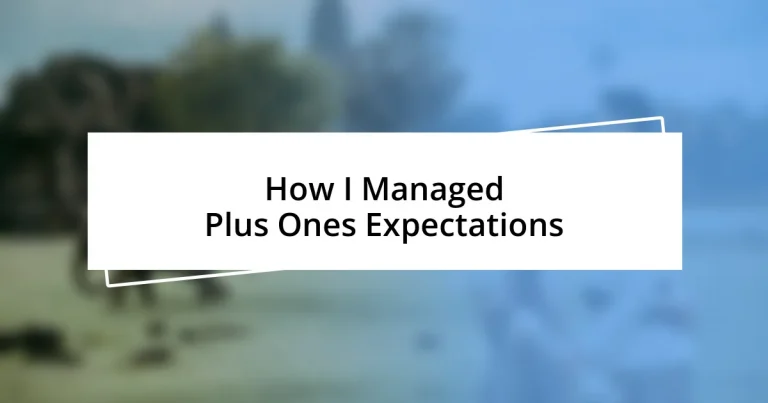Key takeaways:
- Understanding the expectations of a plus one involves recognizing individual comfort levels and discussing desires openly to enhance shared experiences.
- Defining relationship goals and setting boundaries helps foster a mutual understanding, making social gatherings more enjoyable and less stressful.
- Effective communication, including regular check-ins and preparing both partners for social dynamics, can alleviate anxiety and strengthen connections.
- Celebrating both successes and lessons learned in social situations contributes to growth and a richer relationship narrative.

Understanding Plus Ones Expectations
When considering a plus one, it’s essential to recognize each individual’s expectations may vary widely. I remember inviting a friend to a wedding once, and her excitement quickly turned to anxiety about what to wear and who she’d mingle with. This experience highlighted the importance of understanding that for some, attending events involves not just social obligations but also self-image pressures.
Have you ever asked someone how they feel about attending a function as your plus one? I have, and the responses often surprise me. Some individuals thrive in social situations, while others feel overwhelmed, desiring clear agendas or even back-up plans to ensure they’re comfortable. It’s fascinating to realize how different backgrounds shape these preferences.
We often focus on our own desires when inviting someone, but it’s critical to align our expectations with theirs as well. I’ve learned that a simple conversation about what they hope to experience can bridge any disconnect. Ultimately, grasping these nuances paves the way for a more enjoyable and fulfilling experience for everyone involved.

Defining Your Relationship Goals
Defining your relationship goals is like setting the foundation for a sturdy building. I remember a time when I was dating someone new, and we simply never discussed what we both wanted out of the relationship. It felt like we were wandering in the dark, unsure of where we were headed. Having clear goals can transform that experience, turning confusion into a shared vision that both partners can work towards.
To clarify your relationship goals, consider the following:
- Openly discuss what you envision for your future together.
- Identify what values are essential to you both, such as trust, communication, or adventure.
- Evaluate whether you want a short-term or long-term relationship and what that could entail.
- Reflect on individual aspirations that may impact the relationship, like career plans or personal growth.
- Determine boundaries and expectations around commitment and exclusivity.
By addressing these points, I find it’s easier to create a partnership grounded in mutual understanding rather than assumptions. Having these conversations can feel vulnerable, but I’ve found that they lead to deeper connections, transforming uncertainty into a powerful sense of togetherness.
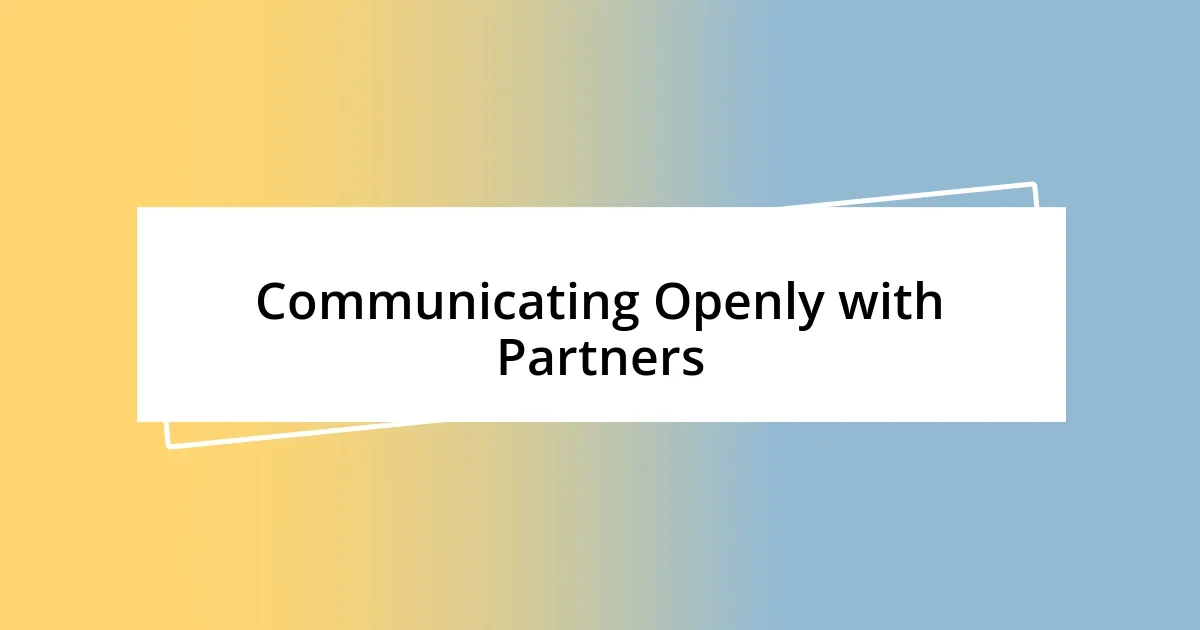
Communicating Openly with Partners
Communicating openly with partners is crucial when managing expectations, especially in social situations. I remember planning a weekend trip with a partner who had very different ideas about what relaxing meant. I assumed a quiet weekend would be ideal, but to my surprise, my partner wanted to explore every tourist spot available. This discrepancy could have turned into frustration if we hadn’t sat down to discuss our individual desires.
I’ve noticed that when my partner and I engage in honest dialogue about our needs, we often discover a happy medium. For example, during a family gathering, I realized my partner felt anxious about fitting in. Instead of glossing over those feelings, we talked openly and made a plan that included strategies to relieve that pressure. Addressing their concerns head-on not only eased their nerves but also made our time more enjoyable together.
In my experience, transparency cultivates trust and companionship. A good practice I adopt is regularly checking in with each other about how we’re feeling about upcoming events. This proactive approach not only helps us adjust plans if necessary but also reinforces the bond we share. Keeping expectations aligned can transform the way we navigate our social landscapes together.
| Your Experience | Partner’s Expectations |
|---|---|
| Assumed a quiet weekend | Wants to explore tourist spots |
| Easy-going social pressure | Feeling anxious about fitting in |
| Regular check-ins | Desire for open communication |
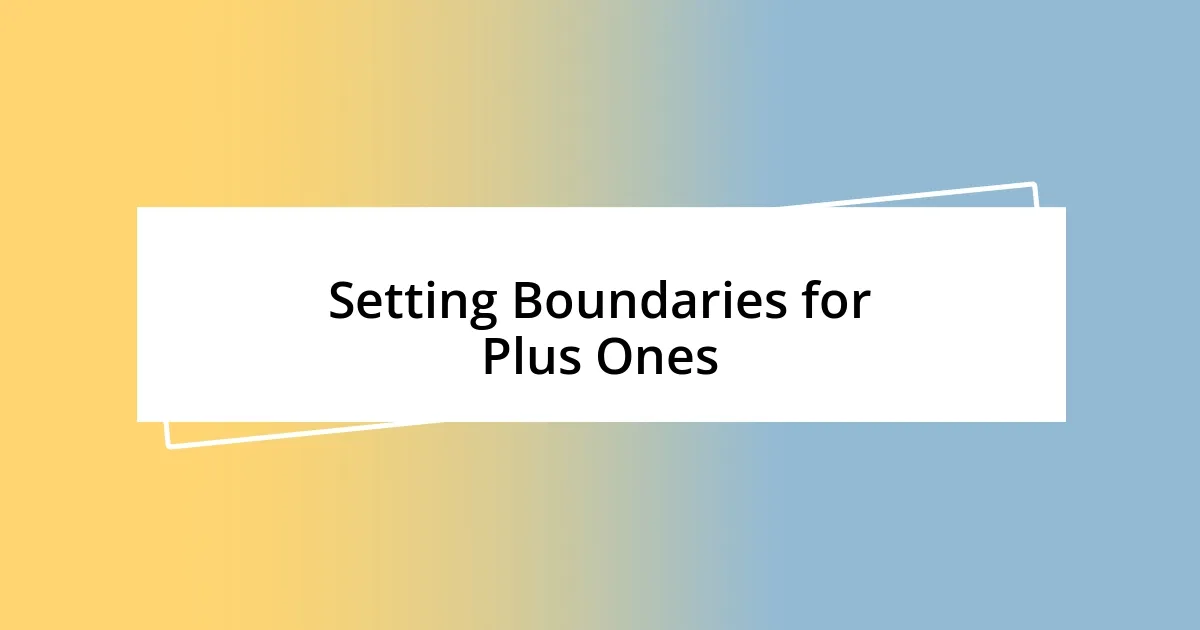
Setting Boundaries for Plus Ones
Setting boundaries for plus ones is an essential part of any relationship. I remember inviting a date to a friend’s wedding and realizing too late that I hadn’t clearly defined our dynamic. As we mingled, I noticed my date seemed uncomfortable trying to navigate conversations with my friends. It struck me then that I hadn’t prepared them for the social landscape they were stepping into.
One way I’ve learned to set boundaries is by having a pre-event chat. Before an occasion, I lay out what kind of interaction to expect, like whom they might meet and the types of discussions that might come up. I once took a friend to a family reunion without preparing them for Aunt Betty’s infamous questions about marriage. That conversation turned awkward quickly! Now, I make it a point to give my plus ones a heads-up, establishing a buffer that allows them to feel more at ease and prevents any unwanted surprises.
Drawing clear lines around plus ones can be a game-changer in fostering comfort. I often ask my date what they’re comfortable with in terms of engagement, like staying aware of their limits regarding social interactions. When my partner expressed feeling overwhelmed at a large gathering, we made a pact to check in with each other throughout the event. Those little conversations can redefine our experience, helping us both feel supported rather than lost in the crowd. How do you set boundaries with your plus one? Of course, it’s all about mutual understanding and respect.

Navigating Family and Friend Dynamics
Navigating the dynamics of family and friends can be quite a journey, especially when introducing a plus one. I once brought a close friend to a family gathering, thinking it would be a relaxed evening. Instead, I watched them shrink back as my relatives peppered them with questions, not realizing how overwhelming that could feel. It made me reflect on how crucial it is to prepare both my friend and my family for each other’s presence.
I’ve learned that managing expectations starts with understanding the dynamics at play. For instance, before my partner attended a family barbecue, I took some time to explain our family structure. I mentioned how my uncle has a tendency to engage in heated debates, while my cousins are more about light-hearted fun. This foresight helped my partner navigate the event more smoothly and allowed for more genuine interactions. Have you ever considered how your loved ones might affect your plus one’s comfort level?
Reflecting on my experiences, I realized that being a good host means catering to everyone’s emotional landscape. At one family dinner, my partner later confessed that they felt awkward and out of place despite the warm welcome. I immediately thought, “What could I have done differently?” Now, I strive to create an inclusive atmosphere by involving everyone in conversations, ensuring my plus one feels less like an outsider. This practice has not only improved my relationships but also enriched our shared experiences. What transformations have you noticed in your gatherings as you’ve navigated these dynamics?
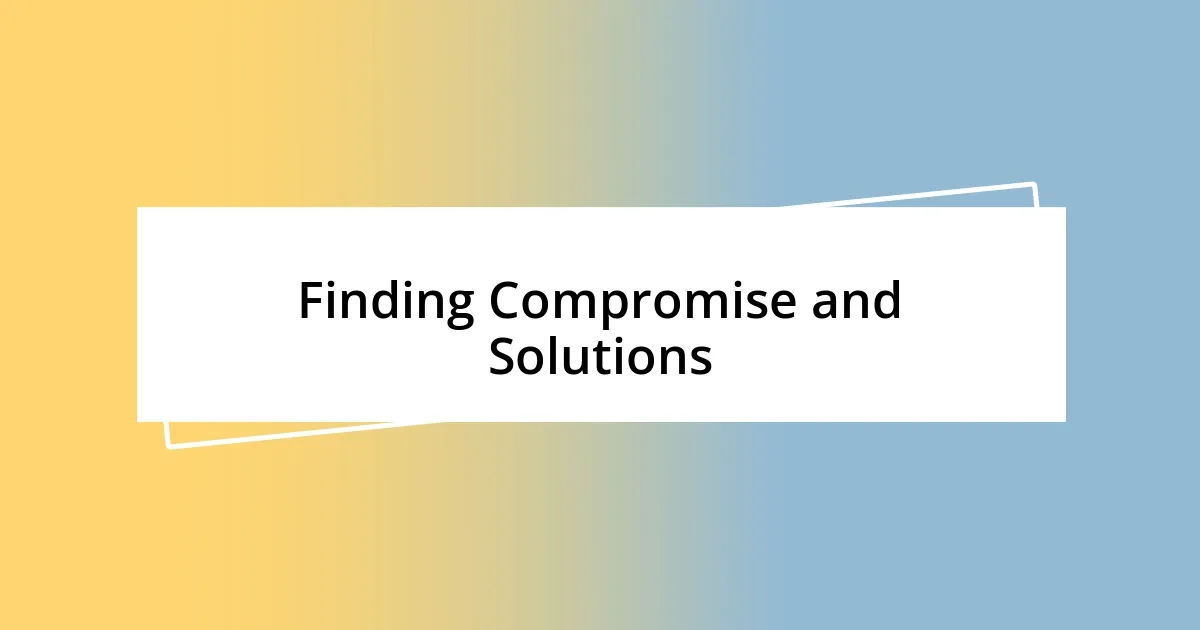
Finding Compromise and Solutions
Finding common ground with your plus one often starts with an open conversation about preferences and concerns. I vividly remember the first time I took a close friend to a work event; they expressed anxiety about fitting in. By discussing everything from dress codes to potential conversation topics beforehand, I helped them feel more at ease. It’s incredible how a little dialogue about expectations can pave the way for a more relaxed experience.
I also believe that compromise plays a pivotal role when dealing with values and boundaries in social settings. For instance, there have been occasions where my plus one wanted to leave early while I was engaged in a lively discussion. Instead of pressing on, I proposed we set a timeframe for how long we’d stay before reassessing the night. This simple strategy allowed us to enjoy the event without one of us feeling neglected or trapped. Have you found that small adjustments can create a more enjoyable experience for both parties?
When I think about incidents that shaped my understanding of compromise, one stands out—a close friend’s wedding where my date felt out of place amidst festive dancing. Realizing this, I suggested we take breaks together to chat and recharge instead of plunging back into the crowd each time. This not only deepened our connection but also left both of us more capable of enjoying the celebration. Reflecting on times like these reminds me how tailored solutions can transform potentially uncomfortable experiences into cherished memories. What adjustments do you think would enhance your next outing with a plus one?
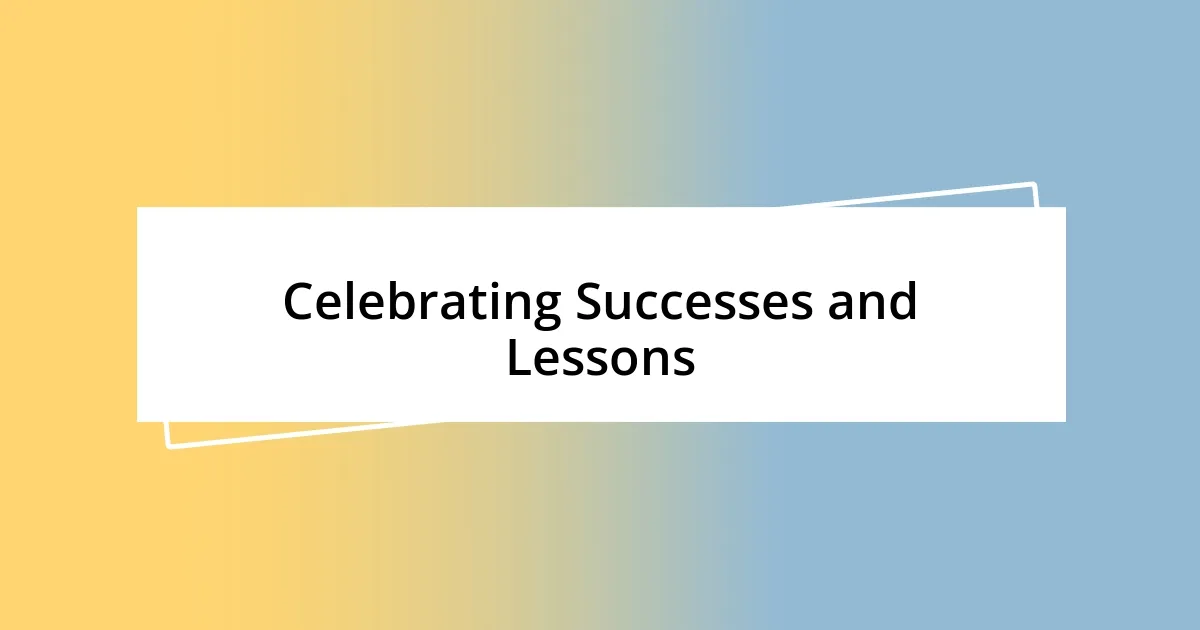
Celebrating Successes and Lessons
Celebrating both successes and lessons learned with a plus one can be a delightful way to strengthen bonds. I recall a vibrant gathering where everything fell into place. My partner engaged seamlessly with my friends, navigating jokes and stories with ease. It felt like a major win when I saw them both laughing heartily, solidifying a connection that seemed effortless. Have you ever noticed how such moments can instill a sense of pride and accomplishment?
On the other hand, not every gathering turns out perfectly. There was a dinner where I thought everything was going well until I spotted my plus one looking lost in the conversation. That moment taught me a valuable lesson about attuning to non-verbal cues. I quickly shifted the flow of the discussion, incorporating topics they would appreciate. This experience helped me realize that celebrating success is often intertwined with learning to be mindful, ensuring everyone feels included and valued.
Looking back, I’ve come to appreciate the small milestones we achieve together. Whether it’s navigating a complicated social scenario or simply sharing a laugh, celebrating these moments creates a richer narrative of our relationship. I find joy in acknowledging both the highs and the lessons—the art of recognizing growth amidst the chaos. How do you celebrate the little victories in your social interactions?












